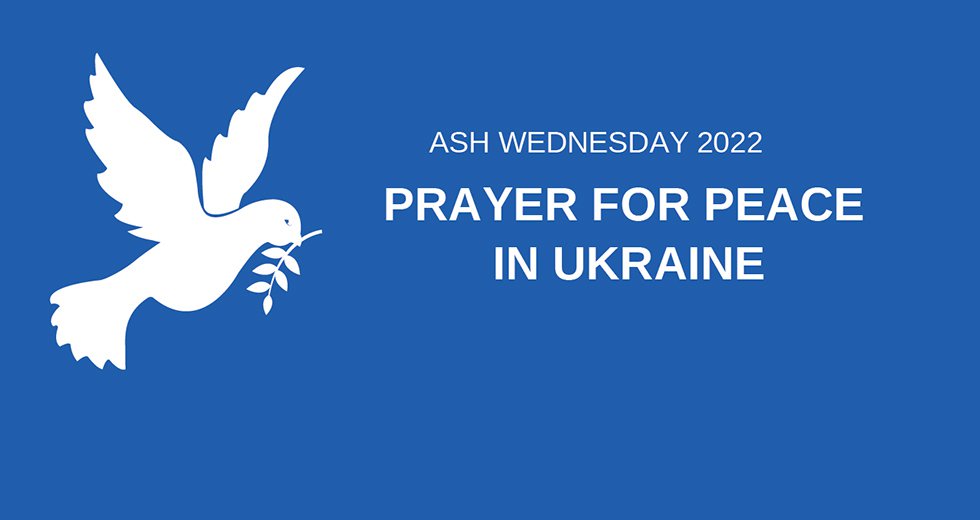On Ash Wednesday over 3000 Christians from 80 countries around the globe joined in a powerful prayer service of lament and solidarity with all those suffering from the effects of Russia’s invasion of Ukraine. Our Reformed Church in Transcarpathia offered an eyewitness report and prayer.

The online ecumenical service included participation by Ukrainian pastors and parishioners living in towns and cities that have been under attack since Russian warplanes, tanks, and troops began a coordinated assault along Ukraine’s eastern border last week.
The service of prayer and chant, Lenten reflections, and personal testimonies was jointly organized by the World Communion of Reformed Churches (WCRC) and Lutheran World Federation (LWF), with participation from the World Methodist Council (WMC), Mennonite World Conference (MWC), Conference of European Churches, Communion of Protestant Churches in Europe, Baptist World Alliance, and Anglican Communion.
In her introductory words, Anne Burghardt, LWF general secretary, decried “the cynical politics” of those who have “thrown the world back into times to which we had hoped never to return.” Speaking of the “horrors of war and displacement,” she said, “A pall of ashes covers Ukraine. The claim of God calls humanity into responsibility: Where is your brother, Cain? We want to shout this claim into the hearts and minds of those responsible for all this violence.”
Reflecting on the passage from the prophet Micah about the need to beat “swords into ploughshares and […] spears into pruning hooks,” Hanns Lessing, WCRC acting general secretary, said these words have inspired peacemakers for almost 3,000 years. Peacemaking is hard work, he said, but all churches are called to this task today. Speaking on behalf of all the world communions gathered for the event, he added: “We are committed to supporting the churches in Ukraine, now and in the difficult days ahead.”
Testimonies from different parts of Ukraine included Alexander Shevchenko of the United Methodist Church in Luhansk, the city on the Russian border which has been in conflict since 2014. He prayed for peace between Russians and Ukrainians and for wise decisions by government leaders in the region and beyond.
Pavlo Shvarts of the German Lutheran Evangelical Church in Ukraine spoke from near the besieged city of Kharkiv, calling for a just peace and for aggressors and victims to be named as part of that process.
Pastor Alexey from the Mennonite church in the south-eastern port city of Berdyansk showed empty streets and closed shops, saying that fuel has been rationed and there are concerns about the availability of food and medicine if the conflict continues.
Kriszta Bado from the Reformed church in the western Transcarpathian region, spoke movingly of the thousands of people fleeing across the border into Hungary where pastors and congregations are mobilizing to take care of these refugees.
"They Left Their Families, Parents And Also Their Congregations"
Krisztina Badó, Bishop's secetary from the Reformed Church in Transcarpathia, Western Ukraine, spoke movingly of the thousands of people fleeing across the border into Hungary where pastors and congregations are mobilizing to take care of these refugees.
Taras Diatlik of the World Evangelical Alliance in western Ukraine and Marek Glodek of the Polish Baptist Union gave thanks for the organization of churches that are supporting people at this time of need, including help for students and seminarians fleeing abroad or to safer locations.
Mykola Danilevich from the Ukrainian Orthodox Church, Moscow Patriarchate, in the capital Kyiv, said that up to 80 people are sheltering underground in his parish each night to escape from the bombings. “We stay with our people,” he said, thanking all his Orthodox, Protestant, and Catholic colleagues who were calling to offer continual prayers and support.
The service continued with a plea for Christians to bring hope through prayers and action at this time of crisis. J.C. Park, WMC president, condemned what he called “a new cold war” and “the despicable propaganda of nuclear weapons.”
César Garcia, MWC general secretary, said people of faith are called to “embody hope for others,” just as the first Christian communities did, standing up against conflict and oppression in their day.
The service concluded with a time of intercessory prayers, which extended beyond the Ukrainian invasion to other war-torn countries including Myanmar, Syria, Ethiopia and the Tigray region, Yemen, Armenia, and South Sudan, and also had a plea to “forgive our bias when we uphold a western narrative concerning refugees. Forgive us when some nationalities are profiled and blocked at the border as they flee Ukraine. All are victims and we are all one human family. Turn us around, O God, towards one another.”
Originally published on the website of the World Communion of Reformed Churches